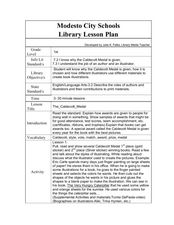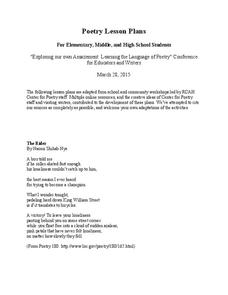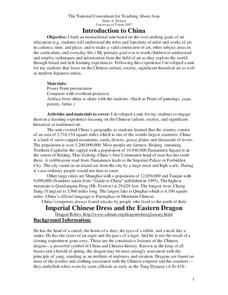Howard Hughes Medical Institute
Human Feet Are Strange
Feet are neat! So, if you've already walked the path of examining animal footprints with your class, put them in the shoes of early humans! A well-designed lesson incorporates video, discussion, and hands-on learning to demonstrate how...
Curated OER
Homes of the World: Ceramic Lesson
Kids consider the various dwellings humans inhabit all over the world. They choose a home from anywhere in the world. Then they research the type of materials, designs, and structures need to build that type of home. The project ends...
Curated OER
Egyptian Relic: Ceramics Lesson
Egyptian artwork is inspiring in so many ways. Learners discover the world of Egyptian relics as they make a ceramic version of their own. Multiple resource links and full instructions make this a fun and easy-to-incorporate art project...
Curated OER
Authors and Illustrators: What do they do?
Help readers understand the roles of authors and illustrators and why they have been recognized by medals of excellence. Your class will discuss and then create illustrations for a book. When they have finished, you can hold your own...
Project Articulate
Textured Landscapes with Grant Wood
Explore the world of textured landscapes through the eyes of the famous artist, Grant Wood. Here is an elementary art lesson in which scholars learn about Grant Wood's life, view his work, draw their own textured landscape, and then...
Residential College in the Arts and Humanities
Poetry Lesson Plans
Need some ideas for poetry lessons? Check out this packet loaded with suggestions for elementary, middle, and high school writers.
Canadian Museum of Civilization Corporation
Propaganda Posters
Don't be put off by the fact that the World War I propaganda posters in this packet are Canadian and some of them are even in French. All the better, in fact, to see the techniques. The richly detailed plan has instructors model...
Curated OER
The Old Man and the Sea: Guided Imagery
What do you imagine when you think of the sea? Put on some ocean sounds, close your eyes, and listen to a guided meditation based on the imagery from The Old Man and the Sea by Ernest Hemingway. After class members listen to...
Tri-Valley Local Schools
Commonly Confused Words
Who gave you grammar homework? Or is it whom? Clarify the meanings of several commonly confused words, including affect and effect, among and between, and then and than with a handout and grammar practice...
Curated OER
Romantic Period in Music, Art, and Literature
“Romanticism aims at enlarging experience by exploring the real.” This excerpt from Jacques Barzun’s From Dawn to Decadence introduces a PowerPoint that examines the characteristics of and the major figures in music, art, and literature...
E Reading Worksheets
Fact and Opinion - Worksheet: 5
After reading 25 sentences, individuals decide if they are facts or opinions. Then, they explain their answer in a supporting sentence.
E Reading Worksheets
Tone Worksheet 5
A speaker's attitude toward his or her subject matter determines the tone of a piece of literature. Interpret the tone of four different poems, as well as their meanings, with supporting textual details.
Curated OER
Introduction to China
Compare and contrast the distinctive characteristics of art forms from various cultural, historical, and social contexts, and describe how the same subject matter is represented differently in works of art across cultures and time...
Curated OER
Communication, Day 5: Saying "No"
There are many ways to say, no. Secondary special needs young scholars need to know when and how to say no when they feel they are in an uncomfortable situation. They sign, say, and role-play how to say no. Worksheets and role-playing...
State Library of Ohio
Tuck Everlasting
A great toolbox of ideas for any teacher preparing to teach the novel Tuck Everlasting by Natalie Babbitt, this resource includes a short biography of Natalie Babbitt, several discussion questions that could double as writing prompts,...
Roland Park Country School
Butterfly or Moth?
What is the main difference between a moth and a butterfly? Butterflies have club-shaped antennae, while moths have a feather-like antennae. But what else differentiates these beautiful insects? The presentation in the resource...
Curated OER
The 50 States
Learners, in groups, research specific regions and states of the United States. They summarize their research and create a poster and PowerPoint presentation with their findings.
Curated OER
What's "Out" There?
First graders investigate the five outer planets. In this space science lesson, 1st graders read the book Our Solar System and identify the five outer planets. Students create a booklet and write about outer planets.
Curated OER
Beyond The Earth Part I
Students explore the solar system. In this space science lesson, students take notes on the solar system provided by their instructors. Students then collaborate to design a computer-generated drawing of the solar system.
Curated OER
Writing a Children's Book -- Young Authors
Students practice their writing skills by creating a children's book. They integrate five elements of short stories into the narrative. They share their stories with their book buddies.
Curated OER
What's "In" There: A Study of the Inner Planets - Mercury, Venus, Earth, and Mars
First graders identify and explore the four inner planets. In this planet science activity, 1st graders watch a PowerPoint about the planets. Students read the book Our Solar System and discuss the inner planets. Students create a book...
Curated OER
The Family Quilt
Third graders examine the artwork of Faith Ringgold. They create their own quilt pattern on fabric and piece them together to create a class quilt. They compare their similarities with one another.
Curated OER
Hand Vase: Ceramics
Ceramics can be a wonderful medium. The class creates fun and funky hand shapes vases inspired by Aboriginal art forms. This would be a great project to do just before Mother's Day.
Curated OER
Habitats
Students examine how different living things interact with their environment. As a class, they discuss the characteristics of a habitat and write the list on the board. In groups, they focus on one habitat and create a mural of the...

























